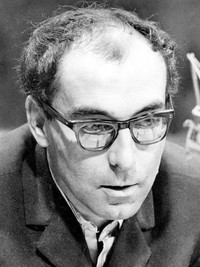Jean-Luc Godard

Few filmmakers had so profound an effect on the development of cinema as Jean-Luc Godard, certainly one of the most important and influential directors worldwide to have emerged since the end of World War II. From his early days as a critic and thinker in the pages of Cahiers du cinema, through the great age of the French New Wave of the 1960s, Godard redefined the way we look at film. An essayist and poet of the cinema, he made the language of film a real part of his narratives. Godard emerged on the international filmmaking scene with his most famous and perhaps best film, "Breathless" (1960), a celebration of the American film noir that also served as the stylistic template for the rest of the 1960s, widely considered to be his most fertile creative period. During that turbulent decade, Godard made no less than two films a year and sometime more, creating such experimental and increasingly politically-minded films as "Vivre sa vie" (My Life to Live") (1962), "Contempt" (1963), Bande à Part" ("Band of Outsiders") (1964) and "Alphaville" (1965), many of which starred his first wife, Anna Karina. After making the critically panned "Weekend" (1967), a disgruntled Godard left the filmmaking business altogether in order to make political films. Once that interest waned in 1972, he entered into a transitional period of video and television projects that eventually segued into a second period of narrative filmmaking that was more experimental and inaccessible than his previous work, though some critics declared this time as being more creatively fruitful. Chief among the works was the controversial "Hail Mary" (1985), a contemporary retelling of the biblical Joseph and Mary story that was tagged by the Vatican as being blasphemous. Whether he was continuing his long love affair with film noir, as he did with "Detective" (1985), or trying new narrative techniques with the ambiguous "King Lear" (1987), Godard was not only a tireless experimenter with form and context, but also synonymous with the world of cinema itself.